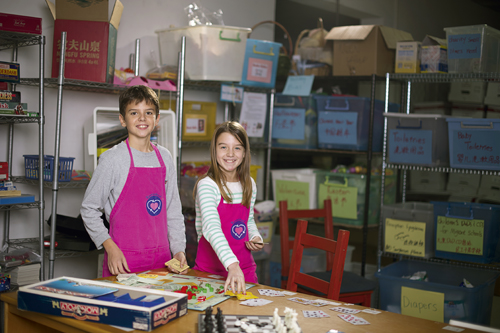
December is the most magical, twinkly month in the calendar. With so much generosity in the air, it’s natural to think of giving to others. For this month’s issue, we speak to Beijing youth who are committed to making a difference in the lives of those less fortunate. This season is traditionally a time for reflection and gratitude, and in this spirit we want to thank our readers, advertisers, contributors, and the entire Beijing community who have made 2014 such a great year for the magazine. Our sincere appreciation and best wishes for you, your family, and your holidays: Happy Hanukkah, Merry Christmas, and Happy New Year!
This is the first part of a three part series.
Seth and Fiona Hodges (Roundabout Charity Store)
Siblings Seth and Fiona Hodges (ages 13 and 11 respectively) hail from Virginia and have been living in Beijing for two and a half years. Both students at the International School of Beijing, they volunteered at Roundabout’s charity store during their last spring break.
What did you do at Roundabout?
Seth: I sorted board games like Scrabble. There was a jumbo edition that had double all the pieces. I also did a lot of DVDs.
Fiona: I sorted dolls and matched them with clothes and shoes, then bundled them up in plastic to be sold in the store. I also sorted crayons and stationary.
How did you find out about the organization?
Fiona: Our mom had been donating our old clothes here, so when my brother’s Bar Mitzvah project came up…
Seth: [I needed] a service project. We looked at some other places, but they were kind of hard to get to, like BEAM [Beijing Education and Mobility] and the Migrant Children’s Foundation. We thought [Roundabout] would be best place because we had to be here every day and it’s a five-minute drive from where we live in River Garden.
Had you done any volunteering before?
Seth: I’ve done some other service projects before. One was at Roundabout with Boy Scouts. We sorted batteries and tested electronics to make sure they worked. Two years ago, on Memorial Day in Virginia, we also went to a cemetery and we had little American flags. We planted them into the ground next to the tombstones of people who had served in the military.
Fiona: I did Girl Scouts in Taiwan, but we didn’t do much [volunteering].
Were there other kids volunteering?
Fiona: We weren’t in the best conditions for volunteering, ‘cause it was still freezing cold and there was a lot of pollution, so we were wearing our masks. There’s a funny picture where we’re smiling but you can’t tell.
Seth: Sometimes there’d be some hot chocolate in the back so you could make yourself some and continue working. After we were done checking the item, we’d put it in the cart and take it over to pricing so they could decide how much to charge for it. Sometimes in games like Monopoly, there were pieces in plastic bags. You had to sort out the pieces and put them in new, clear bags.
Fiona: Sometimes they’d give me big boxes of crayons and pens. I had [to make]packs of 12, arrange them in rainbow order, package them up, tape them, and label them. These were to go to the migrant children. They have to all be useable, not broken or missing paper labels. It’s someone’s first set of crayons in their life, so the idea is that they look really nice.
You were explaining to me before about missing pieces in the board games.
Seth: One piece missing, it’s OK; you just have to label it. Two pieces missing, it depends.
Fiona: There was a big drawer full of game pieces.
Seth: You could find millions and millions of dice. So if the game was just missing a die, that’s easy to replace and you could just say “one replaced die” [on the label]. Same with kings from chess sets.
What was your favorite thing to do while volunteering?
Seth: I really liked testing the electronics. If it couldn’t turn on, you’d look in the batteries and find some to put in there. There were toys like remote-controlled cars and appliances.
Fiona: I liked to do the dolls. It was taking everybody’s random pieces and putting them together. We had one Barbie, and it was dirty but it had pretty hair. We tried to wash it. It wouldn’t come off. But when we covered it in a long-sleeved shirt and scarf, it looked so much better. So it was turning all these old, broken clothes into new articles of clothing by cutting them or something. That was a cool way to re-use things.
What was the most challenging part?
Seth: Sometimes you just had to use common sense to determine whether [a toy]was worth it or not. And that can be challenging. There was an element of thinking “Would I buy this game? Would someone walking through the store buy this game or this DVD or this Barbie?”
Fiona: At first the most challenging part was the whole system of packaging, labeling, and pricing. What if I put something into the wrong bucket and it goes to the store instead of the migrant children? What if it gets priced wrong because I put it in the wrong basket?
In the end, what did you like the most about this experience?
Seth: I liked the fact that I was giving this item a better chance to sell, which meant it was more likely that a charity would get funded. You can ask for a lot of donations, but at some point people stop giving. This is another way to get people to give.
Fiona: I liked that my hard work was going towards helping people who were in need. When you donate at school it’s not really the same thing. You put some money in a box but you never really know what’s going to happen. But this way it was like “right now I’m packaging things that are going to be sold or go straight to [the migrant kids].” It’s going to make them feel better and make money to help their needs.
What advice would you give to other kids who are interested in volunteering?
Seth: Just a little bit of time put in will improve somebody’s life somewhere else.
Fiona: When you come and do something that you like, then it’s really worth your time because one, you’re arranging a game that you like and you know someone else will like if all the pieces are there and two, you know that the money will be going to a really good cause.
Seth: Also, it strengthens community bonds when people come here and volunteer.
Fiona: Yeah.
Roundabout 众爱商店
Mon-Sat 9.30am-5.30pm. Yuyang Lu (behind Yosemite compound), Shunyi District (English: 137 1877 7761, Chinese: 137 1805 3814, roundaboutchina@gmail.com) www.roundaboutchina.com 顺义区榆阳路(优山美地别墅后街)
This article originally appeared on p44-45 in the December 2014 issue of beijingkids. To view it online for free, click here. To find out how you can obtain your own copy, email distribution@truerun.com.
Photos by Dave PiXSTUDIO and Uni You



